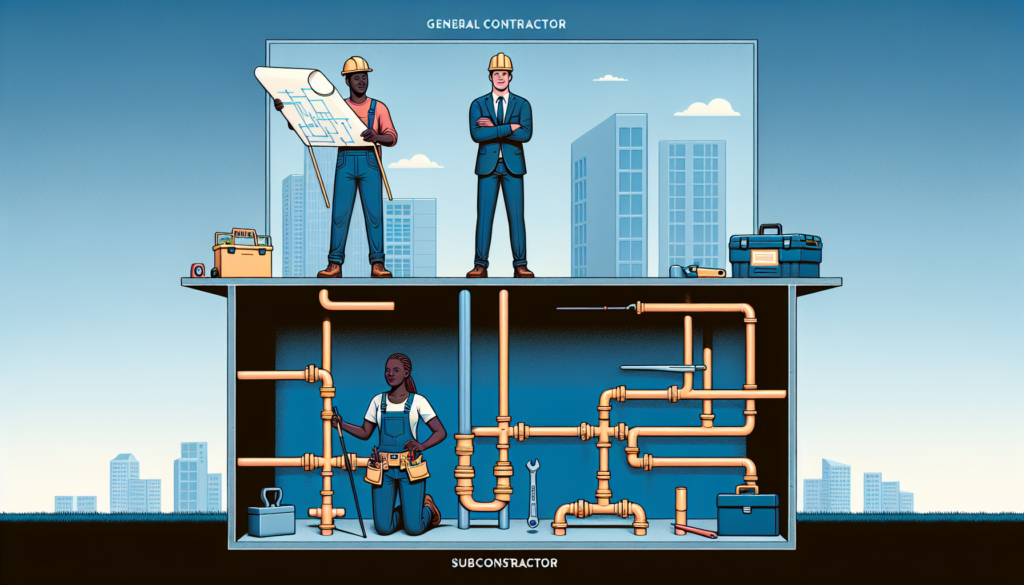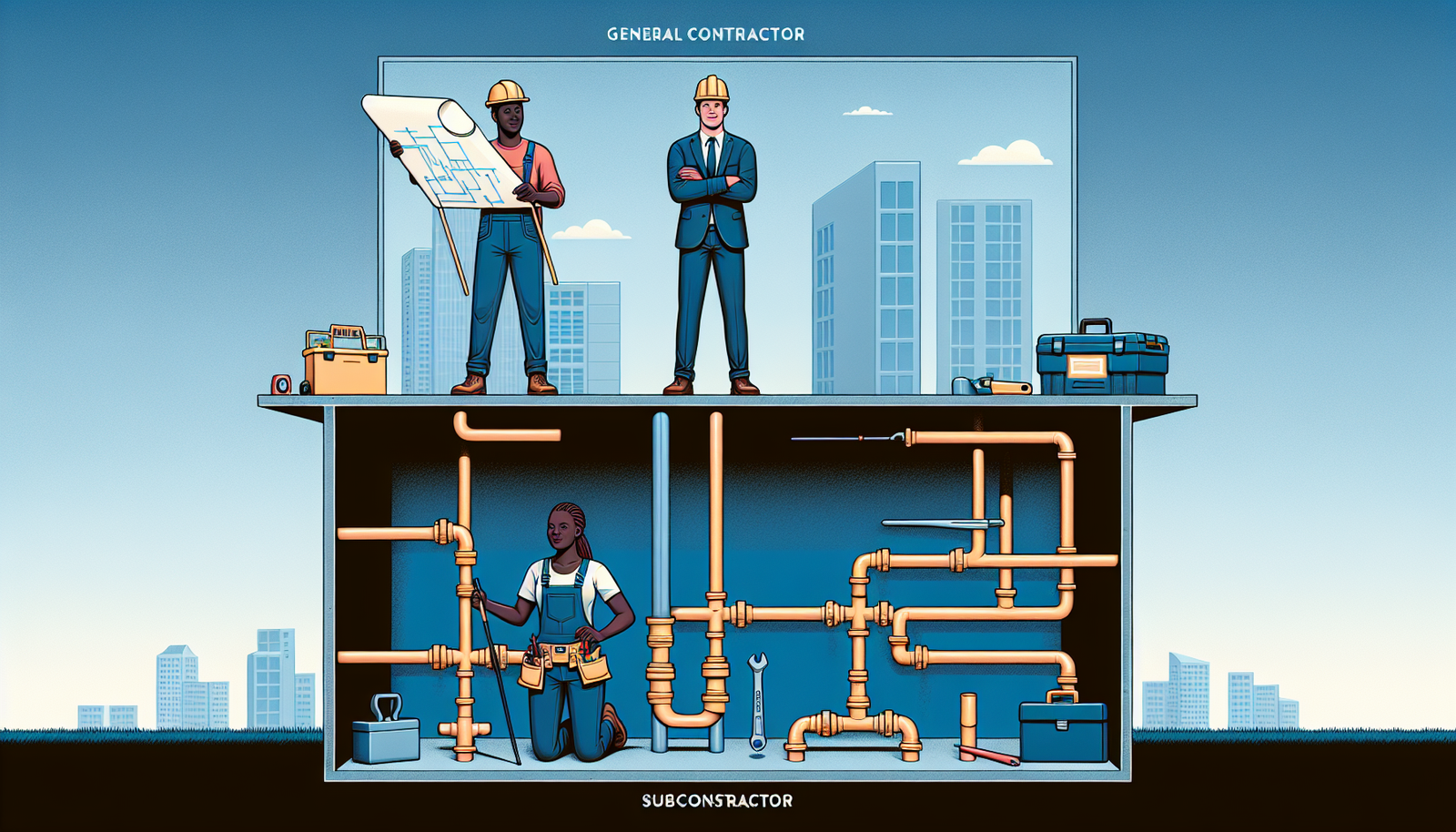Embarking on a construction project in Kingman can initially seem daunting until you unravel the roles of those key players who bring your vision to life. “Understanding Contractor Roles in Kingman: General vs. Subcontractor” serves to demystify the specific functions and responsibilities of these professionals. As you navigate through your next project, you’ll discover that a general contractor orchestrates the overall progress, much like a maestro leads a symphony, while subcontractors are the virtuoso performers, each skilled in their particular craft, contributing to the melody that is your completed project.

Understanding the Construction Hierarchy
Defining the Construction Hierarchy
When you think about a construction project, imagine it like a well-structured organization where everyone has a specific role to play. The construction hierarchy is a system that delineates the levels of responsibility and accountability within a project. Picture a pyramid where at the top you have the project owners, and then it cascades down through various levels of professionals, each with their own specialized functions and duties. Understanding this hierarchy will help you grasp how a project moves from an idea to a completed structure.
Roles and Responsibilities in Construction Projects
Your role in a construction project can vary widely depending on your position within the hierarchy. Project owners at the apex set overall goals and secure financing. Architects and engineers design the structure and define specifications. Below them, the general contractor oversees the actual construction, managing timelines, materials, and personnel. Subcontractors, hired by the general contractor, are the specialized tradespeople who focus on particular aspects of the build such as electrical, plumbing, or roofing. Each role carries specific responsibilities critical to the project’s success.
Navigating Through the Different Levels of Construction Work
Navigating the levels of construction work means understanding who reports to whom, who makes certain decisions, and who is responsible for executing specific tasks. As you engage with different professionals, it’s vital to comprehend the chain of command to ensure smooth communication and efficient project completion. The organizational structure facilitates clear roles, avoiding duplication of efforts and minimizing confusion.
The Role of a General Contractor in Kingman
Primary Responsibilities of a General Contractor
In Kingman, as in many places, your general contractor is essentially the project manager of a construction venture. If you find yourself in this role, you’re responsible for bringing the architectural vision to life. You are the main point of contact between the project owner and the construction team, and you’ll manage everything from the initial planning to the final touches.
Managing the Entire Construction Project
As a general contractor in Kingman, you’ll oversee all aspects of the project. This includes securing materials, hiring subcontractors, scheduling inspections, and ensuring that every aspect of the build adheres to local codes and regulations. Your primary goal is to complete the project on time and within budget, all while maintaining high-quality standards.
Licensing and Legal Requirements for General Contractors
To operate with legitimacy in Kingman, you, as a general contractor, must meet specific licensing and legal requirements. These vary by state and city, but they generally involve passing an exam, providing proof of insurance, and demonstrating financial stability. Staying informed of, and compliant with, these requirements is key to maintaining your professional reputation and avoiding legal issues.
How General Contractors Select Subcontractors
You have the crucial task of choosing the right subcontractors for the job. Selection is often based on the subcontractor’s expertise, reputation for quality, reliability, and, of course, their bid for the work. Strong relationships and trust between you and your subcontractors are paramount, as these are the teams that will execute the specialized work on site.
Subcontractors: Specialized Experts in the Field
Defining the Role of a Subcontractor
As a subcontractor, you play a specialized role in the construction project. You bring expertise in a specific trade, such as electrical, plumbing, or carpentry, and you work under the guidance of the general contractor. Your job is to perform your specialized task to the best of your ability, adhering to the project plans and timelines.
Different Types of Subcontractors
There are as many types of subcontractors as there are different trades in the construction industry. This can include masons, electricians, plumbers, HVAC technicians, painters, and more. Each type of subcontractor brings a different set of skills and equipment to the project, fulfilling a piece of the construction puzzle.
The Relationship Between Subcontractors and General Contractors
The relationship you maintain as a subcontractor with the general contractor is crucial. It’s based on mutual respect, clear communication, and an understanding of the project’s overall goals. Regular interaction keeps the project moving smoothly and ensures that any issues are addressed promptly with minimal disruption.
Legal Distinctions Between General Contractors and Subcontractors
Understanding Contractual Obligations
Your contractual obligations can significantly differ based on whether you’re a general contractor or a subcontractor. As a general contractor, your contract is with the project owner, whereas as a subcontractor, your agreement is with the general contractor. Each of these contracts outlines scopes of work, deadlines, and payment terms.
Liability and Risk Management
In terms of liability, you, as a general contractor, are usually responsible for the overall project, including the work performed by your subcontractors. Therefore, risk management is an integral part of your job, including ensuring all parties are properly insured and all work meets safety regulations.
Insurance Implications for Both Parties
Insurance is non-negotiable. Both general contractors and subcontractors must carry their own liability insurance to protect against potential accidents or damage. While the general contractor’s insurance typically covers the project as a whole, subcontractors must also have their own to cover their specific scope of work.

Contracting in Kingman: Licensing and Permits
Regulatory Environment for Contractors in Kingman
You should be well acquainted with the local regulatory environment, including the specific licensing and permits required in Kingman. Regulations are in place to ensure that construction work is safe, compliant with building codes, and environmentally conscious.
Permitting Process for Construction Projects
Permits are a standard part of the construction process and are meant to ensure projects are well-planned and executed in accordance with local laws. As a contractor, it’s your responsibility to apply for and obtain any necessary permits before work begins, thus avoiding potential work stoppages or legal issues.
Differences in Licensing Requirements
The licensing requirements for general contractors and subcontractors in Kingman can differ, and you must clearly understand the criteria for your specific role. Licenses ensure that construction professionals meet certain standards of expertise and maintain the professional integrity of the industry.
Project Management and Oversight
General Contractor’s Role in Project Management
Project management is one of your core responsibilities as a general contractor. You are charged with keeping the project on track, which involves scheduling, resource allocation, progress tracking, and consistent communication with all parties involved.
Subcontractor’s Participation in Project Execution
While your role as a subcontractor is more hands-on with the actual construction, your participation in project execution is still significant. Adhering to the general contractor’s schedule and quality standards is essential to maintain the project’s flow and ensure the work meets all relevant criteria.
Communication and Coordination Among Contractors
Effective communication and coordination are the lifeblood of a successful construction project. As both a general contractor and subcontractor, staying in touch, keeping everyone informed, and addressing issues swiftly is key to a harmonious and efficient job site.
Quality Control and Assurance
Standards Enforcement by General Contractors
As the general contractor, you have the critical task of enforcing quality standards. This involves conducting regular inspections, managing any required testing, and confirming that all work meets or exceeds the project specifications and building codes.
Subcontractors’ Responsibility for Quality Workmanship
As a subcontractor, your reputation hinges on the quality of your work. Ensuring workmanship meets the expectations set by the project documents and the general contractor is a reflection of your professionalism and dedication to your craft.
Inspection and Approval Processes
Inspections are part of the quality control process and are necessary for project approval. Local building inspectors typically perform these to certify that the construction adheres to code. As contractors, you must be prepared for these inspections and ready to address any possible deficiencies that might be found.
Financial Management and Payment Structures
General Contractor’s Control Over the Budget
You must have a firm grip on financial management as a general contractor, as you control the project’s budget. This includes negotiating costs with subcontractors and suppliers, as well as managing cash flow throughout the project to ensure all parties are paid on time.
Payment Agreements Between General Contractors and Subcontractors
Payment agreements are often milestones in construction contracts, with subcontractors being paid after completing certain phases of work to satisfaction. Clarity in these agreements is crucial to maintain trust and ensure the smooth operation of the project.
Impact of Payment Disputes on Construction Projects
Payment disputes can be a significant source of conflict and can stall a construction project. As contractors, you should aim to resolve any financial disagreements quickly and equitably to keep the project on track and maintain professional relationships.
Conflict Resolution in Contractor Relationships
Common Sources of Conflict Between General Contractors and Subcontractors
Differences in expectations, miscommunication, scheduling conflicts, and payment disagreements are common sources of conflict in construction. Acknowledging these potential issues beforehand can help you anticipate and prevent them.
Strategies for Conflict Mitigation
Effective strategies for mitigating conflict include clear contract language, regular and open communication, and agreed-upon conflict resolution processes in case disputes arise. The smoother the resolution process, the less the project will be impacted.
Role of Legal Intervention in Dispute Resolution
When conflicts cannot be resolved through standard communication and negotiation, legal intervention may become necessary. Arbitration or court proceedings can be used to settle disputes, but these are usually seen as last-resort options due to the potential cost and time involved.
Future Trends in General and Subcontracting in Kingman
Technological Advances Affecting the Construction Industry
Technology is rapidly changing the landscape of construction, with tools like Building Information Modeling (BIM), drones, and project management software streamlining processes and improving efficiency. Staying abreast of these advancements is crucial to remain competitive.
Predicted Changes in Contractor Legislation and Practices
Legislation and industry practices are subject to change regularly, influenced by technological advancements, environmental concerns, and ongoing efforts to improve workplace safety. You must keep informed about these changes to ensure compliance and adapt business practices accordingly.
Adapting to the Evolving Construction Landscape in Kingman
The construction landscape in Kingman, like many other places, is evolving. Sustainability, changing demographics, and economic variables influence how projects are conceived and executed. Being flexible, knowledgeable, and ready to adapt to these changes will position you well for the future in construction contracting.

